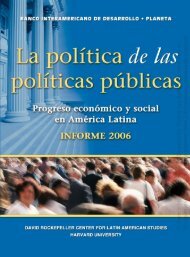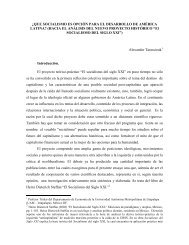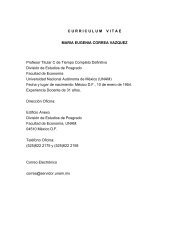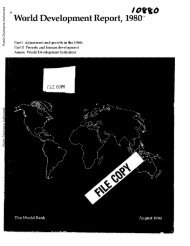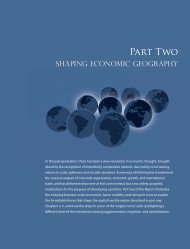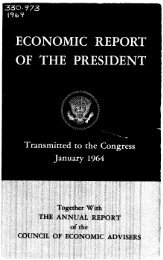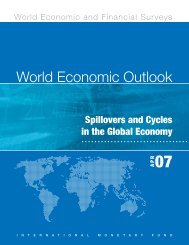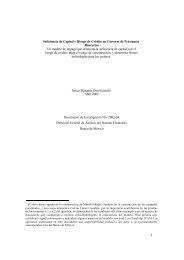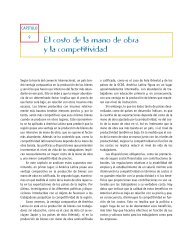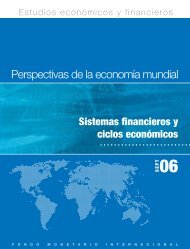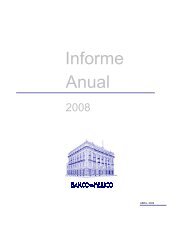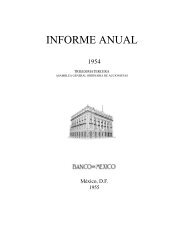World Bank Document
World Bank Document
World Bank Document
You also want an ePaper? Increase the reach of your titles
YUMPU automatically turns print PDFs into web optimized ePapers that Google loves.
vate borrowing more carefully. In Mexico, private dealing with foreign lenders. This runs the risks of<br />
foreign debt was neither controlled nor even regis- limiting foreign borrowing opportunities to welltered<br />
until exchange controls were introduced in established local borrowers and discriminating<br />
1982; now private debtors must register their bor- against smaller innovative companies. Other mearowings<br />
and report any changes every six months. sures are designed to influence the maturity struc-<br />
Part of the reason for closer government involve- ture of a country's debt, such as the prohibition of<br />
ment in private borrowing is that, in a crisis, the short-term borrowing. Finally, monetary policy<br />
central government may be obliged to take respon- may be used to vary the attractions of foreign borsibility<br />
for private sector debt, even if it had not rowing. Many governments have at times raised<br />
initially guaranteed it. This has happened in sev- domestic interest rates in order to encourage capieral<br />
cases, notably Mexico and the Philippines. In tal inflows or discourage outflows, and in some<br />
principle, the government has been required to instances interest rates have been lowered in order<br />
ensure the availability of foreign exchange to ser- to discourage inflows.<br />
vice the debts (transfer risk) while the commercial<br />
risk remained the province of the private compa- Managing market access<br />
nies. In practice, however, the distinction between<br />
transfer and commercial risk has been blurred. Not all financial markets are open to all developing<br />
Mexico's rescheduling agreement has produced countries. A country may be able to obtain Eurolegal<br />
disputes between the government and for- dollar loans but not bond finance or loans in noneign<br />
banks on this very issue.<br />
dollar currencies. Some countries may be able to<br />
Some governments have used indirect measures do swap transactions at low cost; for others, they<br />
to control private foreign borrowing. These may be expensive or impossible. It is important<br />
include withholding taxes on interest payments that debt managers think strategically about how<br />
(for example, Indonesia, Malaysia, and Thailand) to increase access to markets at low cost.<br />
and requirements that borrowers should deposit a Managing market access involves two elements.<br />
proportion of their loan with the central bank at First, coordination is required because borrowing<br />
zero or low interest rates (for example, Brazil and can be much more expensive if several borrowers<br />
Chile). Other governments have set limits on the from the same country approach the same market<br />
interest rates on new private debt, trying to protect simultaneously. Some governments require public<br />
private borrowers who may be inexperienced in bodies to queue up, with only one borrower at a<br />
Table 5.2 Instruments affecting private foreign borrowing in selected developing countries<br />
Withhold-<br />
Ceiling on ing tax on Import<br />
Deposit interest interest restriction Exchange<br />
Prior Minimum require- rate or payments based on rate<br />
Country approval maturity ment spread abroad financing guarantee<br />
Argentina O O O C 0 0 Od<br />
Brazil 0 0 0 0 0 *<br />
Chile C v<br />
v<br />
Qb<br />
Costa Rica * 0<br />
0 0 0<br />
Ecuador 0 0 0 0 0 0 0<br />
Indonesia 0 0 0 0 0 0 0<br />
Korea * 0 0 0 0 0 0<br />
Mexico 0 0 0 0 0 0 0<br />
Morocco * 0 0 0 0 0 0<br />
Philippines * * O * 0 0 0<br />
Sudan *0 0 0 0 0 0<br />
Thailandc Q 0 0 0 0 0 0<br />
Turkey 0 * 0 0 0 0 0<br />
Yugoslaviad * 0 0 0 0 * O<br />
Zambia 0 0 0 0 0 0 0<br />
Note: 0 = instruments used at present or in the recent past; O = instruments not used at present or in the recent past.<br />
a. No new guarantees are provided at present.<br />
b. Not in place at present.<br />
c. Contracting of supplier credit requires <strong>Bank</strong> of Thailand approval.<br />
d. Refers to borrowing by self-managed social sector enterprises.<br />
Source: <strong>World</strong> <strong>Bank</strong> data.<br />
75



